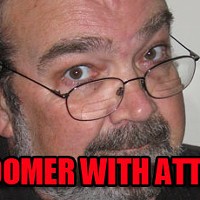Talkin' 'Bout Two Generations
Or, generalizing about 100 million people
We baby boomers catch hell from both sides of the political spectrum. Many conservatives claim my generation led America into moral relativism, depravity, and the break-up of family life and, in general, pushed the nation down the slide toward the end of civilization. Lefties, on the other hand, often say we're a selfish lot who squandered our youthful ideals and settled for cushy jobs and chichi consumer goods.
Finally, someone is defending us. Author Leonard Steinhorn, himself a baby boomer, says we're probably the best thing since, oh, crusty, artisanal sliced bread (quickly swiped through a dish of chili-infused extra virgin olive oil). Steinhorn's book The Greater Generation has been stirring controversy on radio talk shows and in newspapers and blogs around the country, and inviting comparisons of boomers with the older group Tom Brokaw has made a small fortune from calling the Greatest Generation.
Until now I've resisted adding my own comments to what seems to be a pretty superficial treatment of history. My reluctance ended, though, when a friend suggested I'd be crazy not to weigh in on the topic. I believe the exact words were, "The column is called 'Boomer With Attitude,' so what the hell are you waiting for?" Who am I to argue with that kind of reasoning?
You don't produce a nuanced view of history by making sweeping statements about entire generations, but that doesn't bother Steinhorn. According to him, we boomers freed American culture by giving rise to environmentalism and the women's movement, loosening archaic social restrictions and holding government accountable for its lies. America today, he claims, operates under a "new liberal norm" that evinces "the principles of diversity, feminism, and Baby Boom individualism" -- what social conservatives see as a country going down the toilet.
What really makes Steinhorn newsworthy, though, is that he dares to criticize the Greatest Generation -- my parents' generation, those who grew up during the Depression, fought World War II and settled into postwar Leave It To Beaver-ish, gas-guzzling prosperity. According to him, boomers' parents may have fought for freedom and democracy during the war, but once it was over, they were all too willing to accept racism, sex discrimination and mind-numbing conformity in exchange for a slice of suburban heaven.
I say Steinhorn is being unfair to the old-timers; surely one generation can only do so much. I'm pretty sure if boomers had survived the Depression only to be thrown headlong into World War II, we'd have been just as eager as our parents were for a long chill-out phase once Hitler had bitten the dust. I imagine that after 15 years of hell, we would have craved relaxation so much, we wouldn't even have minded the bland '50s singers our parents listened to like Mario "Be My Love" Lanza and Patti Page of "Doggie in the Window" fame.
Steinhorn's biggest weakness lies in his easy oversimplifications. He treats both generations as if they were monolithic entities in which everyone thought and acted the same. Obviously, people born during the same era are going to share many similar experiences, but not everyone will react to them the same way. It may be true that millions of white Greatest Generation members disappeared into the 'burbs and refused to accept the 1960s' and 1970s' social changes. But the same generation also gave us Martin Luther King Jr., Bobby Kennedy, Betty Friedan and a slew of other folks who were agents of those changes. Similarly, the baby boom that produced Bill Clinton and Simpsons creator Matt Groening also gave us George W. Bush and Samuel Alito.
More importantly, Steinhorn, along with most writers who opine on baby boomers, fails to grasp one critical fact: Those of us who protested the war in Vietnam and pushed back against America's social and sexual mores were always in the minority. During the heady days of the late 1960s and the '70s, most people my age either supported the country's establishment or didn't care one way or another. It was a hard vocation to be anti-establishment, and you met with resistance and hate nearly every day -- in fact, that rebel factor was part of the appeal.
The rebel boomers who marched on Washington and hitchhiked to pop festivals came to be identified as representative of boomers everywhere, but it's just not true. If most members of my g-g-g-generation have little interest in social justice or peacemaking today, well, the sad fact is that it's always been that way. Needless to say, it's pretty hard for a whole generation to live up to ideals that only some believed in to begin with.
I think both baby boomers and the Greatest Generation have done pretty well with what they were given to work with. The GG's hung on for one of history's wildest rides and then breathed a well-deserved sigh of relief, and the BB's rode out history while also exerting influence, through the sheer force of our numbers, on the course of that history. It's high time critics got off both our collective backs -- in a generalized kind of way.
Speaking of 4.00000
-
Letters to the Editor
Dec 19, 2007 -
Checking it Twice
Dec 19, 2007 -
Racial Whiplash
Dec 19, 2007 - More »
Latest in Boomer with Attitude
Calendar
-

Wine & Paint @ Blackfinn Ameripub- Ballantyne
-

Angeline’s Featuring Sciandri Family Vineyards @ Angeline's
-

Aria Tuscan Grill Featuring Allegrini - Charlotte Wine + Food Week @ Aria Tuscan Grill
-

Charlotte Wine + Food Week Presented by Truist @ Charlotte, NC
-
 Charlotte Knights vs. Syracuse Mets @ Charlotte Knights
Charlotte Knights vs. Syracuse Mets @ Charlotte Knights
-
A Beginners Guide To Fishing 1
-
Question the Queen City: The unsolved death of Delette Nycum 2
The trial that followed was nothing short of a Charlotte version of the O.J. Simpson spectacle.
-
Crazy Times Require the Sanity of Women
The march continues










